
45 minute read
Corinthian Distractions
Paul sadvice to the Corinthians just might be relevant for today sdistracted Church.

MICHAEL S. HORTON
The commercial capital ofGreece, Corinth was the quintessence of metropolitan sophistication in the region. Athens was the center of academic life, but the practical Corinthians liked to think that they were up on the latest ideas, too. Temple prostitution was big business at the shrine ofAphrodite (goddess oflove). Down the street was the shrine ofAsclepius, the god of healing. In fact, even decades later, after all of the 12 pagan temples were converted to churches in Corinth, the healing shrine continued to be frequented.
The purpose of Paul's letters to the Corinthian believers was news the apostle had received about divisions in the church (I: 11). "Super-apostles," as Paul called them, had gained access to the congregation, bringing confusion in their train, and the apostle's patience was wearing thin:
"For if someone comes to you and preaches a Jesus other than the Jesus we preached, or if you receive a different spirit from the one you received, or a different gospel from the one you accepted, you put up with it easily enough. But I do not think I am in the least inferior to those 'super-apostles.' I may not be a trained speaker, but I do have knowledge" (2 Cor. 11 :4-6).
Indeed, Paul did have knowledge: Not only was he a well-educated Pharisee; he demonstrated a remarkable facility with secular literature and philosophy by quoting pagan poets and writers by memory. In fact, when in Athens, Paul addressed his audience with comparisons and contrasts between Christianity and Greek wisdom. Against the Epicureans, he argued God's sovereignty (Acts 17:2426); but against the fatalistic Stoics, he presented a personal God who took account ofpeople for their actions. Paul quoted from the Cretan poet Epimenides, from the Cilician poet Aratus, and from The Hymn to Zeus, by Cleanthes. This he also does elsewhere, to the Corinthians (1 Cor. 15:33), and to Titus (I: 12). Notice that Paul took the time to become familiar with the culture he was addressing (and quite possibly not simply for evangelistic purposes) and yet he used that familiarity as a bridge for communication, not accommodation:
"In the past God overlooked such ignorance, but now he commands all people everywhere to repent. For he has set a day when he will judge the world with justice by the man he has appointed. He has given proof of this to all by raising him from the dead" (Acts 17:30-31).
The result was not overwhelming, but "a few men became followers of Paul and believed," while others conceded, "We want to hear you again on this subject" (w.32-33).
But in Corinth, the simplicity of the gospel was being undermined by those who sought to turn it into the speculative mysticism of Greek philosophy. Combining Christianity, folk religion, and esoteric wisdom, the "super-apostles" attracted the metropolitan upper-classes much as Eastern philosophy has gathered a following among professionals in our time. Silver-tongued speakers would put on seminars and promise the keys to success and happiness. Because they made at least some appeal to Christ, the super-apostles convinced some of the Corinthian believers that they were simply bringing together the best of secular wisdom and Christian belief. The gospel was not enough; to make Christianity relevant in a pagan commercial center such as Corinth, in order to really market it well, the church had to promise answers to questions the Bible never answered and solve riddles about which the Bible was not the least bit interested. Where the Scriptures were silent, secular wisdom threw in its two cents-worth.
The sophisticated Corinthian, confident and self-assured, had little time for sin and judgment, guilt and grace. Religion was supposed to supply social glue, give people a philosophy oflife and a way of living a happy and meaningful life. In this sort ofsetting, the gospel was probably viewed as an answer to a question the people were not even asking: How can I, a condemned prisoner ofmy own depravity, ever have a relationship with a holy and just God?
But Paul's response is clear. Instead of taking a marketing survey of Corinthian attitudes and developing a gospel that would address "felt needs," he told them what their real needs were, whether they felt them or not. In fact, said Paul, ifthey do not feel within them the need or are not asking the right questions, it is not because the gospel is irrelevant, but because "the message of the cross is foolishness to those who are perishing" (I Cor. 1: 18). "The man
without the Spirit does not accept the things that come from the Spirit ofGod, for they are foolishness to him, and he cannot understand them, because they are spiritually discerned" (2: 14). In other words, if people are not asking the question, "Howcan I be right with God?", it is not because the gospel is dead, but because they are "dead in' trespasses and sins" (Eph. 2: 1). Although the gospel is "foolishness to those who are perishing... to us who are being saved it is the power of God" (1: fS).
Thus, Paul launches on his classic defense of the gospel:
God was pleased through the foolishness of what was preached to save those who believe. Jews demand miraculous signs and Greeks lookforwisdom, butwepreach Christ crucified: a stumbling block to Jews and foolishness to Gentiles, but to those whom God has called, both Jews and Greeks, Christ is the power of God and thewisdom ofGod. For the foolishness of God is wiser than man's wisdom, and the weakness of God is stronger than man's strength (vv.21-25).
Thesuper-apostles were more powerful than Paul in terms of popular appeal. They appeared to be more relevant, offering the recently converted pagans something familiar, and they made it sound so captivating. They could really sell the product, and Paul was being put on the back burner a bit. In fact, their success suggests that the super-apostles spoke more directly to the felt needs of the Corinthians. And what were those felt needs? Probably not much different from those about whom Paul warned Timothy: "People will be lovers of themselves, lovers of money, boastful, proud, abusive ... rash, conceited, lovers ofpleasure rather than lovers of God" (2 Tim. 3:2-4)-and these are professing Christians!
This is the problem, isn't it? By preaching to "felt needs" we are often preaching to selfish and idolatrous cravings. Whatwill be the "felt needs" of people who love themselves, money, and pleasure? Our job is not to preach to felt needs, hut to expose such felt needs as sinful cravings that must be supplanted by Christ. Only in this way can unbelievers see their truest, deepest need for the One whose absence these distractions have sought to soothe.
Instead of taking a marketing survey of Corinthian attitudes and developing a gospel thatwotlld address "felt needs," Paul told the Corinthians what their real needs were, whether. they felt them or not.
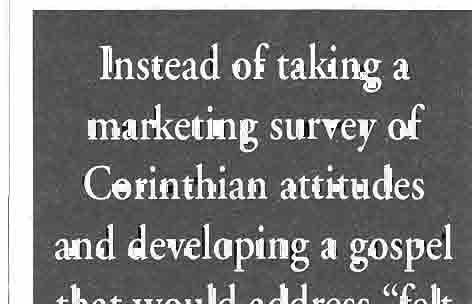
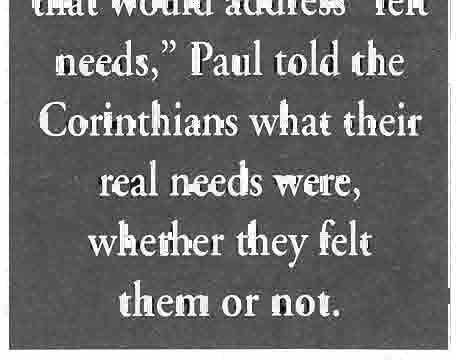
In the meantime, Paul responds to the problem with the super-apostles by telling the Corinthians they are simply shallow and immature, captive to "the wisdom ofthis age," which did not even have the sense to recognize the most remarkable triumph of Divine wisdom in history: the satisfaction ofGod's justice and mercy in the cross of Christ.
But Paul didn't let the Corinthian Jews ' off, either. While Greek cultureChristianity turned Christian discourse into a combination of magic, selfreflection, and speculation, Jewish sympathies led to a different distraction: signs and wonders. Paul says both promise what God considers weak.
The cross was a stumbling block to the Jews also in that accepting its message meant coming to terms with the fact that they could not save themselves, not even with God's help. They were helpless to participate in their own redemption and this public picture ofChrist hanging on a cross, carrying the weight of our sins, meant that all of their works had been for nothing. Salvation by grace alone, through faith alone, because of Christ alone, was a scandalous notion to a religion that had become increasingly legalistic by the time of Christ.
Part of the problem is that, as fallen men and women, we want power not only for the advance of the church in a secular culture, but even for ourselves. There is something exal ting about being a part ofsomething that is respected by society. Ifwe can build larger buildings, have larger gatherings, create larger enterprises, and compete with other mass-marketed products, we will be a part ofsomething powerful, something relevant and the world will have to sit up and take notice of us for our impressive technological, and financial, sophistication.
This is what was driving the Corinthian believers, too, who had forgotten their roots. This is what Paul points out immediately after he had described the gospel as a stumbling block:
Brothers, think of what you were when you were called. Not many of you were wise by human standards; not many were influential; not many were ofnoble birth. But God chose the foolish things of the world to shame the wise; God chose the weak things of the world to shame the strong. He chose the lowly things of this world arid the despised thingsand the things that are not-to nullifY the things that are, so that no one may boast before him. It is because of him that you are in ChristJesus, who has become for us wisdom from God-that is, our righteousness, holiness, and redemption. Therefore, as it is written: 'Let him who boasts boast in the Lord' (vv. 26-31).
The Corinthian believers did not want to win their sophisticated neighbors as much as they wanted to be like them. In a culture that idealized wealth,
Christianity made little sense. In the face ofall ofthis, Paul expects the Corinthians to tell their neighbors that their SaviorGod was sentenced to death by (a) his own people, (b) the Roman authorities, and (c) God the Father himself. Thus, salvation in this scheme is the result ofa shameful death on a cross which, for Romans, had the equivalent criminal associations we would make with the electric chair. No wonder many cultures have found it difficult to understand this core message of Christianity! Nevertheless, at the point Christianity is least saleable, it is the most powerful. The resurrection was such an overwhelming concept that those gathered in Athens to "hear the latest ideas" told Paul, "We'll hear more from you again on these things."
But today, we hardly say enough to provoke the sligh test in terest. In bending over backward to be relevant, we have actually become politely irrelevant, mumbling when we get to the bit about judgment, hell, wrath, condemnation, human helplessness and our utter dependence on the grace and righteousness ofsomeone outside of us, namely Christ. "Give us a god who shows us an example of greatness-power, virtue, wisdom; not a god who dies for us, but one who shows us how to live!" That is what the modern Greeks demand, just as others demand miraculous signs. But Paul continues his defense with the following:
When I came to you, brothers, I did not come with eloquence or superior wisdom as I
proclaimed to you the testimony about God. For I resolved to know nothing while I was with you except Jesus Christ and him crucified. My message and my preaching were not with wise and persuasive words, but with a
demonstration of the Spirit's power, so that your faith might not rest on men's wisdom, but on God's power. (2: 1-5) seen about Paul's superior education, he himself adds, "I am not in the least inferior to the 'super-apostles'" (2 Cor. 12: 11). And yet, "I did not come with eloquence orsuperiorwisdom." There was not going to be a test to see whose gospel was the cleverest, whose gospel was the most relevant, whose gospel could attract more attention. "For \ I resolved to know nothing... except Jesus Christ and him crucified. "
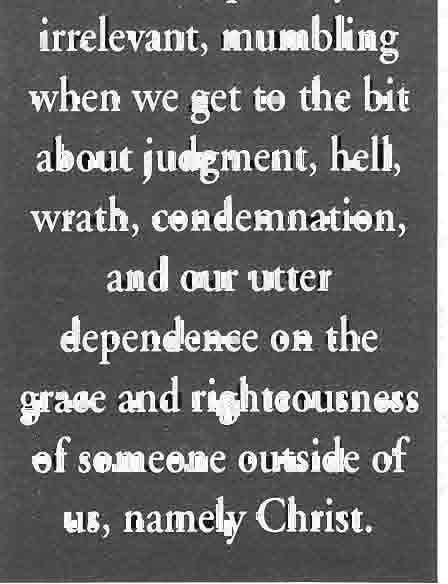
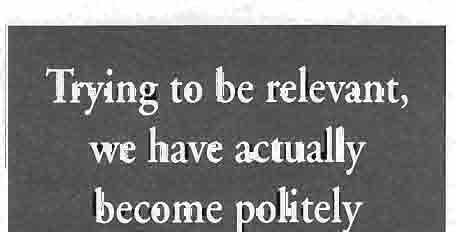
Trying to be relevant, we have actually . become politely irrelevant, mumbling when we get to the bit about judgment, hell, wrath, condemnation, and our utter dependence on the grace and righteousness of someone outside of us, namely Christ.
We want to stand out, to be relevant and "in touch," but when we don't talk about Christ, oreven sin, judgment, grace and redemption enough for even regular churchgoers to be able to articulate their theology, we couldn't be more irrelevant. I wonder, judging by the most common themes in evangelical preaching and publishing, whether we are ashamed of the gospel. Perhaps it is not as up-to-date or relevant as healing ministries, 12 step programs, or Christian cruises. It presents stumbling blocks to the miracle-seekers and wisdom-seekers of the age. But the gospel is not about ourseeking, but God's; not about our ascent, but his descent.
A great many Christians at the end of the 20th century appear to be interested in everything except Christ. You name it, we've got it! But the one thing we no longer believe in is the gosp'el. There's no room for irrelevant dogmas about original sin, total depravity, guilt, atonement, propitiation, substitution, justification, the sovereignty of God, regeneration, judgment, heaven and hell. Nearly every one ofthese doctrines in our day is up for grabs; one does not have to hold a narrow position on these issues to wear the evangelical label.
However, an evangelical must be absolutely certain about how to tackle issues such as abortion, pornography, socialism, affirmative action, homosexuality, the gifts of the Spirit, and the precise chronology ofend-times events. While the Bible does indeed have something to say about our behavior, spiritual gifts, and eschatology, often issues rarely discussed in the Bible have become the standard tests of orthodoxy, while the most obvious biblical motifs are largely unknown.
The evangelical church must follow the advice ofthe Apostle Paul and leave all of the distractions behind; it must speak less self-confidently and begin declaring its confidence in the person and work of]esus Christ. There must be a recovery ofthe riches ofmysteries that have been finally revealed in the living and written Word. Until the gospel is clearly known again in our ungodly culture, we must put every other pursuit, every other distraction, every other interest or fascination in abeyance, declaring to the sophisticated foolishness ofour age, "I resolved to know nothing among you except Christ and him crucified." 0
Send afriend agift subscription to modernREFORMATION
The Moralistic Impulse in American Evangelicalism



By Dr. DARYL G. HART
Economic issues .. may have been decisive for the 1992 presidential election, but social and cultural questions were never far from voters' minds, especially the evangelical segment ofthe electorate. In recent years, America has become increasingly polarized in what sociologist James Davison Hunter calls a ((culture war." Hunter argues in Culture Wars: The Struggle to Define America that the most contested political issuesabortion, gay rights, education, public funding for art, the composition of the Supreme Court-are not the marginal concerns of a few zealous lobby groups, but reflect profound moral and religious differences within American society.
On one side of this struggle are the orthodox party: conservative Catholics, Jews, and evangelicals who have normative and supernaturally derived views about what is right or wrong. They are pitted against the progressives: liberal Catholics, Jews, Protestants, and secularists who question whether absolute moral standards exist and promote tolerance and diversity as the basis for social harmony. Since the November election, this cultural divide between the orthodox and progressives has surfaced once again as policy proposals and appointments of President Clinton reveal his stand on abortion, gay rights, and public education. In reaction, many evangelicals are gearing up for another battle to impede America' s moral decline. There is even talk ofresuscitating the Moral Majority.
Leaving aside the merits of Hunter's analysis and the thorny questions surrounding a Christian response to politics, the book Culture Wars does underline one ofthe chief characteristics of American evangelicalism, namely, moralism. Throughout the history of the United States, evangelicals have mobilized most often, against groups, ideas, or practices thought to be immoral, and therefore, a threat to the nation. Northern evangelicals, for instance, advocated the immediate abolition of slavery, irrespective of the political consequences, because holding slaves was a sin. So, too, evangelicals responded to the dangers ofalcohol, not by forging an
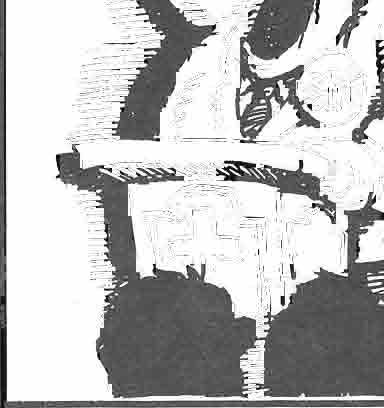

attitude of moderation and responsibility, but by pushing for laws that would prohibit the sale and consumption ofalcohol. So too, the flap over teaching evolution in public schools that began in the 1920s has little to do in evangelical minds with the merits of different scientific explanations, but more often has resulted from fear about the corrosive effects of evolutionary teaching on the morals ofimpressionable youths.
The point of highlighting evangelicalism's habitual concern for upright conduct is not that morality is unimportant or that such matters as slavery, drunkenness, and evolution do not call for a Christian response. Rather, the question is, Why do evangelicals so often resort to moral categories when struggling with personal and public issues when .other factors (theological, economic, and political) are often just as important? What we see in the history of evangelical involvement in public life is the triumph ofwhat Joseph Haroutunian described as a move from ((piety to moralism," where the danger of sinful conduct supersedes questions about knowledge, beauty, and the nature of reality. But to describe the problem is

not to explain it. For an explanation of evangelical moralism some attention to the history of religious and political developments in the early United States is in order.
At the time ofthe nation's founding, the United States faced a profound crisis of authority. Gone were the old institutions such as the monarchy and a national state church that provided order and stability for cultural and political life. In fact, this was precisely what the revolution was about: getting rid ofthose corrupt European institutions. Centralized power, whether in the crown or in the church, was considered coercive. For that reason the founders advocated limited government and religious freedom. This would prevent tyranny from rearing its ugly head in the new world.
Nevertheless, America's political elite believed that virtue was crucial to the well-being of the nation. The political philosophy of the revolution, republicanism, taught that virtue was essen tial to a free and democratic society. The church and the state could not force people to behave in certain ways, but individual citizens were still expected to behave. For deists who supported the revolution, the simple ethical teachings ofJesus, such as the Golden Rule, were sufficient for nurturing the virtue essential to national prosperity. Leaders such as Thomas Jefferson and James Madison, even though suspicious of religious enthusiasm, believed churches were important for maintaining social order. According to George Washington, religion and moralitywere "indispensable to political prosperity." The theological baggage that often buttressed such morality was not desirable, but the moral habits that Christianity encouraged were' quite desirable. Similarly, Protestant clergy enthusiastically embraced Enlightenment ideas about society and the good life, and in the process turned from older Calvinistic ideas about ethics by severing the moral teachings of Christianity from systematic theology. The Puritan tradition insisted that grace was necessary for genuine virtue (action that glorified God), and insisted that ethical decisions grew out of a theology of redemption. But the necessities of democracy and loss of traditional institutions forced American Protestants to defend ethics from the standpoint of the new political ideology.
Fears about the corruptions of the Old World, where the defenders of Christianity often resorted to the authority oftradition or to an established church in order to enforce moral norms, left American Protestants with little choice but to affirm the democratic axiom that all men and women, both regenerate and unregenerate, knew intuitively the difference between right and wrong. In so doing, American believers were able to defend Christian conceptions ofvirtue as necessary for the success of the new nation even though the principles upon which the nation was founded precluded any particular theology from being established.
Not only did the dynamics of American politics sever ethics from theology, but they also cemented the ties between Protestant mores and the American way oflife. The United States at the time of its founding was overwhelmingly Protestant; 85% of the population could trace their cultural heritage to one ofthe branches ofBritish Protestantism.
A broad consensus existed, therefore, on the kind of behavior that was acceptable. Evidence of this consensus can be found in the public schools ofthe new nation, where religious instruction was an important component of the curriculum. Bible reading, prayer, hymn singing, and church history were included in public school curricula so that students would grow up to be virtuous citizens.
What made this practice objectionable was not just that Protestantism had been reduced to morality, but also that Protestant mores had become politicized. As immigrants,came to the United States (many of them Catholic and Lutheran) and resisted the coercive nature of Protestant dominance in the schools, evangelicals who thought that virtue was necessary for the heal th ofthe nation branded such resistance as "unAmerican."
Ofcourse, the political developments of the early United States do not alone explain the moralism that so often plagues evangelicalism. Particular emphases within evangelical theologyfrom a higher estimate ofhuman nature to the revivalist's call for individuals to make a decision for Christ-also encourage the separation ofethics from doctrine. Nevertheless, the particular socio-political forces that have influenced American evangelicalism should not be ignored. Stripped of the traditional means for restraining evila strong state informed by a national church-Americans were forced to depend upon their own internal resources to withstand temptation. The American revolution and the Enlightenment philosophy that supported it made it difficult for Christians to argue for older, traditional Protestant understandings ofindividual virtue and public morality. To say that men and women could not be good apart from grace was also to admit that government was necessary for restraining evil, and thus, was to call into question the American experiment itself. For the founding fathers believed that Americans could be good without the heavy hand of the government, and they premised the well-being of the nation upon the inherent virtue of the citizenry.
Two lessons, then, can be learned from the relationship of religion and politics in the early republic. The first is to see clearly the mistake of reducing
Christianity to ethics. No matter how much we might think Christianity produces good citizens, the ultimate aim of the gospel is not to make the world safe for democracy, but to reconcile God and sinners. Such reconciliation does not come through the good behavior of believers; rather, that good behavior, which in the lives of believers is often mixed with bad, is the result of grace. We cannot talk' about morality apart from grace. This is another way of insisting that we cannot talk about ethics apart from theology.
The second lesson to be learned is to recover a Reformational understanding ofthe differences between the genuinely virtuous acts produced by grace that glorify God, and a mere civil righteousness that provides a standard for public life. While Calvin and Luther taught that the ordinary good works of obeying laws could not in anyway please God, they still argued that sinners were capable offollowing and should adhere to public standards of moral conduct. Keeping this distinction in mind will not prevent Christians from having a voice in public debates about common standards of decency, but it should check the habit of identifying public morali ty with Christian ethics that has been so characteristic of American evangelicalism. A common understanding of public morality is indeed a proper topic for political debates, but by distinguishing between civil righteousness and Christian virtue, such debates need not degenerate into culture wars. 0
Dr: Daryl G. Hart is the director ofthe Institute for the Study of American Evangelicals at Wheaton College, Wheaton, IL.
Free Tape!
An Introduction to CURE Call 714-956-CURE
Christ & the
Book of Revelation
By RICH GILBERT
Every time something big happens in the news (especially if it involves the Middle East) it seems a new set of books, reinterpreting the book of Revelation, is published. It is therefore no surprise when, the reader begins to get the impression that the book of Revelation is a very dark, mysterious book that is difficult, if not down right impossible, to understand; and despairing of his own ability to make sense of it, he often avoids the book altogether. This is tragic, and need not occur, for the difficulty in understanding the book of Revelation has less to do with the book itself, than with its interpreters.
There were two things, concerning the scriptures, that the Reformers were certain of. The first was that the basic message of the scriptures is clear to anyone who can read them (this is in contrast to the Roman Catholic Church, which taught that the Scriptures were a dark book, and that you needed a priest-ultimately, the Pope-to interpret them for you), This does not mean that every part of Scripture is equally clear. Some passages are, indeed, difficult to understand and it helps to have the consensus of the Church through the centuries to correctly interpret them. But the basic message of what man's condition is, who Jesus is and what he's done for us, and how I can be saved, is perfectly clear.
The second thing that they were sure of was that the scriptures were about Christ. This is no less true ofRevelation, than it is ofany other book ofthe Bible. Again, this is not to say that everything in Revelation is as plain as the Gospel of John, nor do I claim to understand everything in it perfectly (for that matter, that's true for all of the scriptures as well). Mter all, the book ofRevelation is part of the genre known as apocalyptic literature, that is to say, it is full of symbolism. It employs numbers and images that were very familiar to first century Jews and Christians to get its message across. To understand the book ofRevelation it is essential to have some knowledge ofwhat these numbers and images represent. Most people are familiar with some ofthese already ( 3 is the number for the triune God, 4 is the number for creation, 6 is the number for man, 7 is the number for perfection, 12 represents the tribes of Israel or the apostles, 1,000 is a number for completeness-so when a number like 666 is used it means always coming short of perfection, or a number like 144,000 is 12 cubed times 1,000 meaning a great multitude, everyone who's meant to be included is, with no one left out). But Revelation, like the rest of scripture, is about Christ, and any interpretation that ends up with something else as central (either intentionally or unintentionally) has not only missed the entire message of the book, but, to put it simply, is wrong. By, "about Christ", is meant that it is about his person (he is both fully God and fully man), and his work (his life, death, and resurrection) on our behalf, and not merely about his Second Coming. Usually, these books treat the doctrine
ofthe return ofChrist as, at best, merely a side note to the events that are supposedly leading up to his second coming. It's easy to get the impression that these books could be written without mentioning that Christ is coming again, and not significantly change their content.) Well, it's fine to say that Revelation is "about Christ," but it remains to be shown how it is "about Christ."
It is important to note first the circumstances under which this letter was written. What was John's purpose? This letter was written during a time when the Church persecuted aohn was was increasingly being himself exiled to the island of Patmos under this persecution). The power ofthe state was beginning to be used with great force against the Church. Christians were being tortured and killed for their faith. They were watching their friends, and their family members die horrible deaths. Doubts were beginning to arise about the wisdom of being a Christian. Christ had promised them that the gates ofhell would not prevail against his Church. Now they were beginning to wonder ifit actually might.
So John writes a letter to encourage them. He shows them how all things are still in God's all-powerful hands. Christ, to whom "all power and authority has been granted" will ultimately triumph over the forces ofevil arrayed against the Church. This is so because he has, in fact, already defeated them.
John does not set forth a chart book of the end times for his readers; he sets forth Christ. Christ is "the Almighty," "the First and the Last," "the Beginning and the End," "the Alpha and the Omega" (1:8; 21:6; 22: 13). In short, he is God himself, the one "who is and who was, and who is to come" (compare 1:4 with 1:8). He is "the ruler ofthe kings of the earth" 0:5).
The believer can take courage, whatever happens to him (even death), because his eternal destiny is in Christ's hands. Christ has done it all for him. Recognizing this, the elders around the throne lay their crowns at his feet (they realize that they can take no credit for either being there, or for receiving their crowns, and that they owe all to Christ alone). Christ is " the firstborn from the dead" (1:5). He "was dead" yet is "alive for ever and ever" (1: 18). By his death on
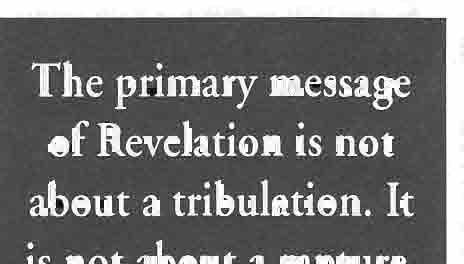
our behalf He "has freed us from our sins" (1:5). How has He done this? By emptying the wrath ofGod onto himself, and dying in our place, the just for the unjust, he has satisfied the justice of God, and canceled the debt we owed.
Thus he disarmed Satan ofhis greatest weapon against us, his ability to accuse us ofour sins before God (cf. 12: 10). By his resurrection he "holds the keys of death and Hades" (1:18). It is Christ who, alone, is found worthy when none of us were (ch. 5). The Christian is righteous because he has washed his robe and '( made it white in the blood of the lamb," i.e., because Christ's death has covered his sins. The fine linen that the bride (the Church) . wears, to the wedding feast, is a gift. We are told that this fine linen represents righteous deeds. Our righteousness is something' given to us. It is not our own. It is an alien righteousness. It is Christ's righteousness given to us 09:7-8). This is meant to give courage to the Christian undergoing persecution, because, ifChrist has been able to do all this, then surely, all things in this world are in His hands as well.
Ultimately, the forces ofevil, arrayed against the Church, will be defeated completely, and all their deeds will be punished. Satan will no longer be able to attack the Church. He will be cast down and bound forever in the lake offire. His access to God will be cut off. God will put all enemies under Christ's feet and he will establish, fully and forever, the reign he now already has over all things. Then, there will be a new heaven and a new earth where there will be no more suffering, no more death, no more tears, for he shall wipe away all tears, and the Christian shall be with him forever. The great truths of the Reformation are affirmed in the book of Revelation. Christ is central. We are saved by him, not by anything we have done to deserve it. His righteousness is imputed to us, and it's on this basis that we have any standing with the Father.
This is the message of Revelation. It is not about a tribulation. It is not about a rapture. It is not about the European Community uniting or a one world government. It is not about Russia attacking Israel. It is about Christ, and what he has done, continues to do, and will do, for us. And, just as we must not take away anything from the message, we must not add anything to it by our interpretation, or the warnings contained therein will apply to us. Amen. Come Lord Jesus. 0
Rich Gilberr is asraffwrirer for CURE, agraduare of Chrisr College Irvine, and a Lurheran layman.

By MICHAEL S. HORTON
There are three wilderness . experiences are absolutely fundamen tal to the understanding of redemptive history. The first is the wilderness experience of Adam and Eve in the garden of Eden. Most ofus are familiar with the story in Genesis 3; there is a provision in the wilderness that of all the trees in the garden "you are free to eat from any tree in the garden; but you must not eat from the tree of the knowledge of good and evil, for when you eat ofit you will surely die." This was a wonderful provision, for the two could eat any fruit from any tree in the garden that God had made, with the exception of one. But in spite of God's generous provision, the two rebelled in the wilderness. God's word was questioned. "Did God really say, 'You must not eat from any tree in the garden'?" Satan asks. Notice how Satan adds to God's prohibition of eating from the one tree to eating from "any tree" in the garden. Eve gives her own addition to the word of God in responding to the serpent, "We may eat fruit from the trees in the garden, but God did say, 'You must not eat fruit from the tree that is in the middle ofthe garden, and you must not touch it, or you will die. '" Both Satan and Eve wind up making God a stricter God than he has revealed himself to be. How many times have we seen this tendency. We sin by adding to the word of God our own doctrines, our own opinions, or our own rules that God has not commanded. And many people rebel because they have gotten themselves to believe that this God is worthy of mutiny, this God who would withhold


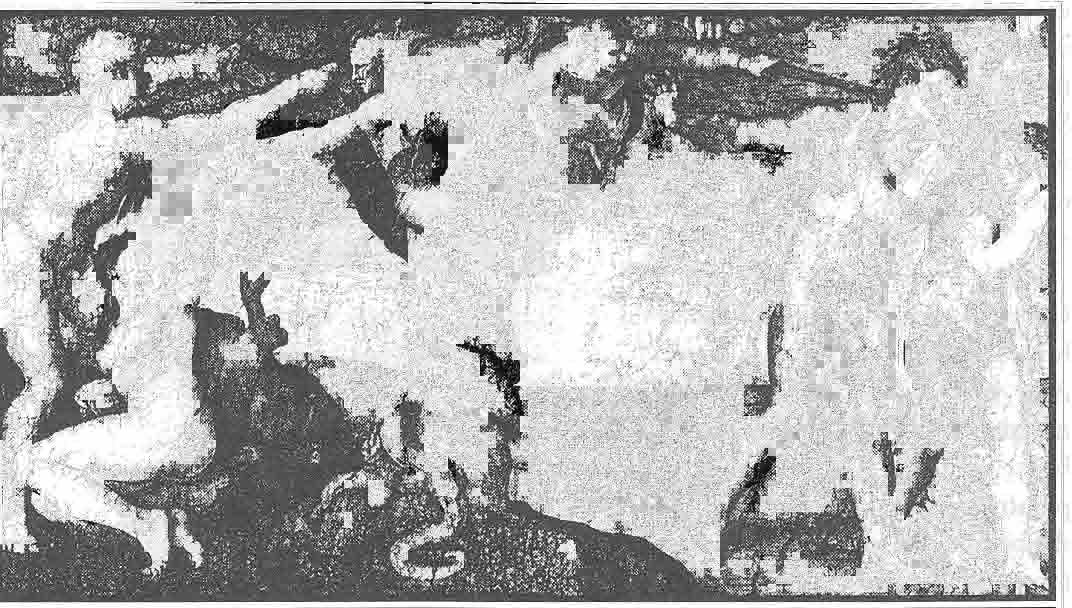
provisions and basic pleasures from them. God's word is undermined in another way in this text, but this time by subtraction. "Did God really say ... ?" Satan asks. How many times do we hear this question today, "Did God really say such and such was a sin?" "Did God really say that Jesus is the only way to heaven?" Then finally there is the fullscale rejection of God's word in Satan's words, "You surely will not die." You see, Satan cunningly started with subtle legalistic additions to the word of God, then by liberal subtraction, and now by outright rejection. Eve was deceived when she listened to the devil's advice and looked upon the fruit of the forbidden tree. "When she saw that it was pleasing to the eye and desirable to make one wise she took the fruit and ate . ... " Instant gratification! If you eat this fruit you shall be like gods, and you can have it all now! Adam and his wife would have been offered fruit from the tree oflife ifthey would have obeyed God's command during the probationary period there in the garden, but Satan says in a sense, no ... you can have it now, you can be like gods, you can have glory now instantly, without having to wait. Sound familiar? It sounds like an ad we'd see on television today doesn't it.
So there is provision in the wilderness, rebellion in the wilderness, and now judgment in the wilderness. "Their eyes were opened and they knew that they were naked." I ran across a poem that expressed this kind of awakening:
I have taken the pill, I've hoisted my skirts to my thighs and dropped them to my ankles. I've rebelled at the university, skied at Aspen, lived with two men, married one, earned my keep, kept my identity, and frankly, I'm lost.
That is the modern spirit. There is a sense, perhaps as never before, that the more we rebel against God the more alienated we become. We know that we are naked, our eyes are opened but we are no wiser, just more ashamed. We're running from God, hiding, sewing together fig leaves ofour own making to cover up ourshame and nakedness. Ever since Adam and Eve, we have been running away from God, not seeking him. "We want to ((seek God" about as much as a wanted crimin'al wants to find a policeman. But as Paul states, ((there is no one who seeks after God." Adam and Eve tried to cover their shame by leaves they had sewn for themselves. We do the same. Sometimes even church can become a way of doing that. We come to church squeaky clean with our best Sunday suit and cheerful smile, but for many of us, this is just an attempt to cover our shame. There is something else here in the wilderness, however. There is a promise. If you remember, God tells them, (( Satan will bruise his heel, but your seed will crush his head." And then God sets out to cover their nakedness and shame with an ani-mal he "himself sacrifices to provide the covering, pointing forward t{) the final rest through the body and blood ofChrist, sacrificed for Adam and Eve's rebellion in the wilderness.
The second wilderness experience is recorded in Psalm 78. The background for this Psalm is the remembrance of God's deliverance of Israel from the slavery in Egypt. Even in the middle of the wilderness, God gave his people manna from heaven and water from a rock. But there was rebellion in the wilderness:
They forgot what God had done, the wonders he had shown them. He did miracles in the sight of their fathers in the land of Egypt, in the region of Zoan. He divided the sea and led them through; he made the water stand firm like a wall. He guided them with the cloud by day and with light from the fire all night. He split the rocks in the desert and gave them water as abundant as the seas; he brought streams out" of a rocky crag and made water flow down like rivers. But they continued to sin against him, rebelling in the desert against the Most High. They willfully put God to the test by demanding the food they craved. They spoke against God, saying, "Can God spread atable in the desert? When he struck the rock,

water gushed out, and streams flowed abundantly. But can he also give us food? Can he supply meat for his people?" When the LORD heard them., he was very angry; his fire broke -out against Jacob, and his wrath rose . against Israel, f-or they did not believe in God or trust in his deliverance. Yet he gave a -command to the skies above and opened the doors of the heavens; he rained down manna for the people to eat, he gave them the grain of heaven. Men ate the bread of angels; he sent them all the food they could eat. He let loose the east wind from the heavens and led forth the south wind by his power. He rained meat down on them like dust, flying birds like sand on the seashore. He made them come down inside their camp, all around their tents. They ate till they had more than enough, for he had given them what they craved. But before they turned from the food they craved, even while it was still in their mouths, God's anger rose against them; he put to death the sturdiest among them, cutting down the young men of Israel. In spite of all this, they kept on sinning; in spite of his wonders, they did not believe. So he ended their days in futility and their years in terror. (Ps. 78:11-33)
They did not remember :what God had done, the Psalmist said. They refused to trust in God's deliverance and trusted in their own strength. They refused to live by God's word, for they put God to the test by making demands. They demanded the food they craved. Nothing has changed much, has it? The people of God are still like this today. fu long as God is sending the manna we are happy, but the instant something goes wrong we complain. And so we become cynical about God's provision, ((What, is God going to spread out a table in the wilderness?" Then there is judgment in the wilderness. While the food was still in their mouth, God struck them dead. The Psalmist says he ended their days in futility (like the curse in Eden) and their years in terror. Once again Paradise is lost. The Kingdom ofGod is taken from a physical location back up into paradise. Just as the people of God lost their place of rest in Eden, so too, the people ofGod lost their place of rest in Israel.
But there is also salvation in the wilderness. Justas God promised salvation to Adam and Eve after their rebellion, so too there -is a promise of deliverance in the midst of all of this:
He sent [the ark ofj his might into captivity, his splendor into the hands of the enemy. He gave his people over to the sword; he was very angry with his inheritance. Fire consumed their young men, and their maidens had no wedding songs; their priests were put to the sword, and their widows could not weep. Then the Lord awoke as from sleep, as a man wakes from the stupor of wine. He beat back his enemies; he put them to everlasting shame. Then he rejected the tents ofJoseph, he did not choose the tribe of Ephraim; but he chose the tribe of Judah, Mount Zion, which he loved. He
built his sanctuary like the heights, like the foot against astone.'" Jesus answered, "It says: is written: 'Man does not live by bread earth that he established forever. He chose 'Do not put the Lord your God to the test.'" alone but by every word that comes out
David his servant and took him from the sheep When the devil had finished all this tempting, of the mouth of God. '" Instead of pens; from tending the sheep he brought him he left him until an opportune time. twisting scripture, he simply submits to to be the shepherd of his people Jacob, ofIsrael it. Again Satan offers instant divinity, his inheritance. (Ps. 78:61-71) Instead of feasting in the wilderness, "I will give you the kingdoms of the as in the fruit of the garden of Eden, or world and all their authority and
God did not let an entire generation on the bread as in the desert, Jesus chose splendor." Jesus was of course divine, enter his rest. The generation in the fasting instead of feasting. The food but he was also human, and there is no wilderness that demanded the food they Christ craved was the word of God. In doubt that this was a real temptation of craved and would not trust his this temptation in the wilderness, Satan our Lord. But Jesus remembered that deliverance. It did not matter that they again appeals to that which is pleasing to his mission was not to rule the kingdoms were Jews, God struck them dead and the eyes, and also to instant gratification, of this world, for his kingdom was not barred them from Paradise as he did the shortcut to glory. Satan says, "Look, of this world. Though he sovereignly Adam and Eve. And God swore in his if you will just bow down and worship rules the world through providence right wrath that they would never enter his me, look at all the kingdoms you could now, his kingdom is not identified with rest. But to the remnant of Israel, God have. I could make you the emperor of any earthly kingdom. When he returns, sent David to be a shepherd over the the world! And I will give all of this to all of the kingdoms of this world will people. you, immediately! You can't really know become the kingdom ofour God and of
And then finally we come to the last whether or not God will reward you at his Christ and once again Paradise will temptation in the wilderness, the the end of your life, you've got to take not only be a heavenly rule, as it is now, temptation of Christ: things into your own hands. Ifyou want but will be a new heaven and a new it done right you've got to do it yourself. earth. But Jesus responds with the
Jesus, full of the Holy Spirit, returned commandment, "You must from the Jordan and was led by the Spirit worship God alone .... " This second in the desert, where for forty days he was Jesus Christ Adam, this second Israel, refuses to tempted by the devil. He ate nothing accept Satan's offer of instant during those days, and at the end of them is the second Adam. He gratification. No shortcut to glory he was hungry. you are the Son The devil said to of God, tell this him, stone "If to lived for us. This Adam for this way to Adam, for the cross. he At will last go an all the Adam become bread." Jesus answered, "It is successfully made it through that would not cave in to the lie! written: 'Man does alone but by every not word live that on bread proceeds his probation in the wilderness temptation help us in our Howdoes Christ's victory own over from the mouth of God.'" The devilled and won for us the right struggle? Hebrews records the him up to a high place and showed him following: in an instant all the kingdoms of the to eat from the tree of life, world. And he said to him, "I will give which is his own flesh. By Because he himself suffered when he you all their authority and splendor, for was tempted, he is able to help those it has been given to me, and I can give it trusting in Christ, all men are who are being tempted. (2: 18) For we to anyone me, it will I want to. So if you worship all be yours." Jesus answered, co-heirs of the promise do to not have a high sympathize with priest who is unable our weaknesses, but "It is written: 'Worship the Lord your together with Israel according we have one who has been tempted in
God him and serve him only.'" to Jerusalem and had The him devilled stand on to the apostle Paul. every way, without sin. just as (4:15). we are-yet was the highest point of the temple. "If you are the Son o'f God," he said, "throw Now think about that. Jesus yourself down from here. For it is written: Let me give you instant happiness. I can Christ really did endure real temptation. "'He will command his angels concerning you give it to you now ... why wait." He was tempted in every way. He was to guard you carefully; they will lift you up in Instead of putting God to the test, tempted sexually, he was tempted in their hands, so that you will not strike your Jesus responds to the devil by saying, "It terms of greed and power, he was

tempted just as we are, yet without sin. So what is our response to this. Do we see this primarily as a moral example for us to follow: "IfJesus did it, we can do it too?" No, Jesus did not fulfill obedience in this temptation as a moral example chiefly. He fulfilled it as our substitute. Don't you see, Jesus is the true Israel. Jesus Christ is the second Adam. He lived for us. This Adam successfully made it through his probation in the wilderness and won for us the right to eat ftom the tree of life, which is his own flesh. By trusting in Christ, all men are co-heirs of the promise together with Israel according to the apostle Paul. Jesus is the tree of life in the paradise of God for he said, "I am the way, the truth, and the life ... " Jesus is the bread in the wilderness for he said in John 6, "I am the bread of life. Your forefathers ate the manna in the desert, yet they died. But I am the bread that comes down from heaven, which a man may eat and not die. If anyone eats of this bread, he will live forever." He was the rock that broke open in the wilderness out of which water flowed for the people there.
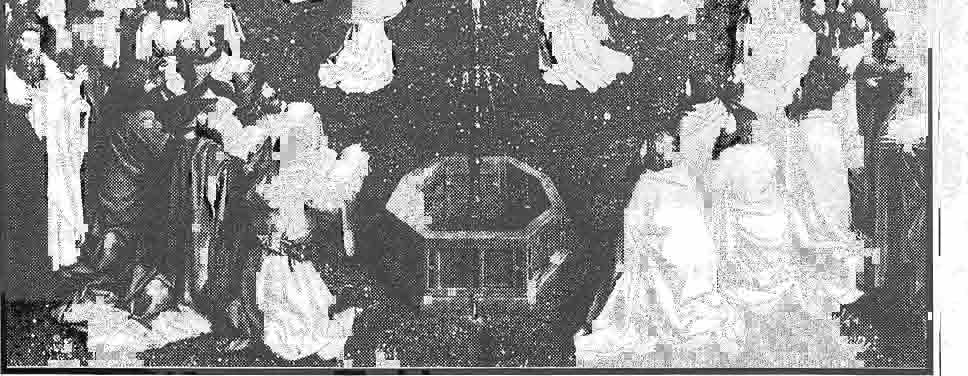


1Cor. 10 states, "They all ate the same spiritual food and drank the same spiritual drink; for they drank from the spiritual rock that accompanied them, and that rock was Christ." He is the sabbath rest and the promised land. He says, "Come to me, all you who labor, and I will give you rest." Even though there is no earthly paradise, no land ofCanaan until Jesus returns, there is still an eternal rest into which we can enter. And we enter that rest by faith. Jesus is the Joshua that leads us into the promised land. He is the Davidic king. He lived for us and he died for us. He was the sacrifice whose righteousness covers our nakedness and shame, the lamb ofGod foreshadowed in the sacrifice God made to cover Adam and Eve, and in the sacrifices of Israel. He was the final sacrifice for sin. All who trust in his atoning death are declared not guilty. Paul says he was crucified for our sins and raised for our justification. We do not achieve justification; he did by rising from the dead. We do not submit to it, we do not let him subdue us, we do not get into the flow, we do not live the victorious Christian life.
Jesus Christ has accomplished the highest form ofperfection and victory for all Christians, though we suffer, fail, and struggle with sin in innumerable ways. He also prays for us. At this very moment, and at moments when you are engaged in giving into temptation, you have a defense attorney at God's right hand in the heavenly courtroom pleading your case, showing the Judge his nailscarred wrists for you.
Paul said the gospel is a stumbling block to the Jews because they are looking for «signs and wonders." That sounds like a contemporary preoccupation. He said the gospel is foolishness to Greeks because they are looking for wisdom. But because we are in Christ, we do not set our hopes on what is pleasing to the eye, we do not look to our own strength or to our own righteousness but to God's infallible word that promises us things we do notsee. We stake ourconfidence and place our trust in things we do not feel. Now we can endure temptation and suffering, not in order to win the prize ofsalvation, but because someone has already won it for us, and we share that prize by virtue of our union with him through faith. In view ofChrist's successful probation in the wilderness experience, let the dying embers of your faith be fanned into a bright, warm, and cheering flame. Let us turn our eyes from seeking our salvation, our happiness and joy in perishable things, fixing our eyes on Christ, the author and finisher of our faith. And let us cast aside those sins that so easily set us back in our journey through the wilderness content to feed only on Christ, God's living word, the tree of life, the rock ofliving water, the bread from heaven, whose blood is the wine of heaven that washes away your failures to resist temptation in the wilderness. 0


